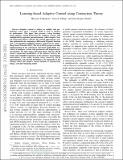Learning-based Adaptive Control using Contraction Theory
Author(s)
Tsukamoto, Hiroyasu; Chung, Soon-Jo; Slotine, Jean-Jacques
DownloadAccepted version (914.7Kb)
Open Access Policy
Open Access Policy
Creative Commons Attribution-Noncommercial-Share Alike
Terms of use
Metadata
Show full item recordAbstract
Adaptive control is subject to stability and performance issues when a learned model is used to enhance its performance. This paper thus presents a deep learning-based adaptive control framework for nonlinear systems with multiplicatively-separable parametrization, called adaptive Neural Contraction Metric (aNCM). The aNCM approximates real-time optimization for computing a differential Lyapunov function and a corresponding stabilizing adaptive control law by using a Deep Neural Network (DNN). The use of DNNs permits real-time implementation of the control law and broad applicability to a variety of nonlinear systems with parametric and nonparametric uncertainties. We show using contraction theory that the aNCM ensures exponential boundedness of the distance between the target and controlled trajectories in the presence of parametric uncertainties of the model, learning errors caused by aNCM approximation, and external disturbances. Its superiority to the existing robust and adaptive control methods is demonstrated using a cart-pole balancing model.
Description
2021 60th IEEE Conference on Decision and Control (CDC), 14-17 December, Austin, TX, USA
Date issued
2021-12-14Department
Massachusetts Institute of Technology. Nonlinear Systems LaboratoryPublisher
IEEE
Citation
H. Tsukamoto, S. -J. Chung and J. -J. Slotine, "Learning-based Adaptive Control using Contraction Theory," 2021 60th IEEE Conference on Decision and Control (CDC), Austin, TX, USA, 2021, pp. 2533-2538.
Version: Author's final manuscript